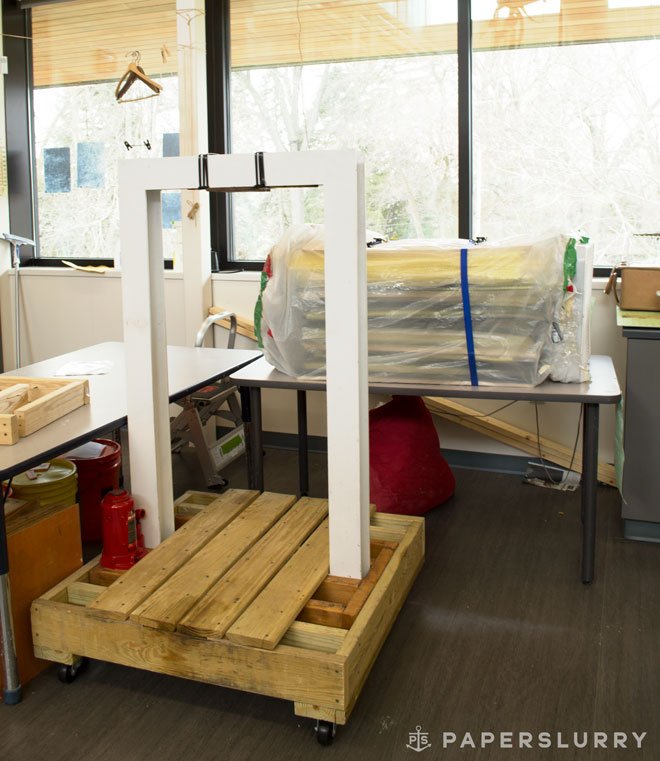Inside Edgewood College’s Paper Studio: Handmade Paper’s Role in Art Therapy
Hand papermaking’s tactile, experimental nature lends itself to applications in a variety of settings. The possibilities are seemingly infinite with potential for sculpture, wet media, book arts, and drawing (just to name a few).
At Edgewood College in Madison, Wisconsin, art therapy students are sharing papermaking with the community through their outreach programs. Click through for the full story!
ART THERAPY AT EDGEWOOD COLLEGE
Janice Havlena, professor of art therapy, generously gave us a studio tour, and shared with us how their studio evolved. The Edgewood College Paper Studio is unique in that it includes hand papermaking in both a studio art context and art therapy program.In other contexts, Professor Havlena has also used papermaking techniques in her collaborations with Studio E, an art therapy program for adults living with epilepsy. Professor Havlena’s combined knowledge in art therapy and handmade paper is making a large impact in Madison’s communities.
EXPLORING THE HANDMADE PAPER STUDIO
Denim cloth rag for hand papermaking at Edgewood College Paper Studio
Handmade paper art, papermaking at Edgewood College
Hydraulic press and restraint drying system in the hand papermaking studio
Moulds and deckles for making handmade paper at Edgewood College
Drew Mattot, of Peace Paper, taught a workshop at Edgewood while their visual arts building, The Stream, was still a pile of blueprints. Thanks to this serendipitous timing, Drew collaborated with the art department faculty to shape the design of the studio. The studio features a separate beating room, rubber floors for easy cleanup, and large windows that fill the studio with natural light.
Students work with a Lee McDonald Oracle Beater, a portable hollander beater. The beater room also houses a small fridge for pulp storage. Rather than using linters or half stuff for pulp, educators at Edgewood focus on teaching students how to process rags and collected plant fibers into pulp.
Each semester, students hand bind sample books of all their handmade paper, along with recipe and project documentation for future reference. This documentation process reinforces the scientific and historic foundations of handmade paper.
Also, a number of biology students enroll in the class each semester, creating a diverse and unique working environment that supports the role of hand papermaking in an interdisciplinary setting.
Students are encouraged to experiment with a variety of fibers, processes, and paper sizes. On one side of the room are stacks of standard size moulds and deckles handmade by Cory Vineyard of Dr. Deckle & Mr. Mould. Across the room, larger experimental moulds and foams lean against the wall. The student projects that line the walls convey how much true experimentation (and fun!) takes place here, from laminate and relief casting, to pigmenting and pulp printing.
Robert Possehl teaches both an introductory papermaking class and “Visual Narratives”, a course that focuses on place, in both and conceptual and material sense. The working definition of place is decided by each individual student as it applies to their work. Possehl encourages students to think of the various ways handmade paper can inform their conceptual work, ranging from the source of the fiber to topographical maps (seen above).
Hand Papermaking as a Transformative Process
Art Therapy and Papermaking at Edgewood College
Art therapy students incorporate a variety of handmade paper techniques in their community workshops. One project combines Nepalese style papermaking and a stenciling technique to create shaped icons. Workshop participants then incorporate the icons into larger discussions and narratives about place and identity, as well as larger book making projects, drawings, and mixed media works.
As in the studio arts coursework, there is a large emphasis on the transformative properties of papermaking on both a material and metaphorical level. Workshop participants are encouraged to bring in an item to pulp, perhaps something they’d like to move on from.Papermaking allows the participants to physically transform their selected material and build upon it, creating artwork or written personal narratives on the substrate, allowing the students to not only free themselves from that material possession, but use it as an impetus for creative and personal development.Edgewood College actually hosted the first Panty Pulping workshop with Peace Paper Project co-founder Margaret Mahan, another influence on Edgewood’s community engagement efforts and transformative paper workshops. These collaborations inspire both the communities that they reach and the handmade paper community, as we learn different ways to incorporate handmade paper techniques into a variety of settings and social contexts.
Article and photos by Katharine DeLamater
FURTHER READING:
Interested in participating in a transformative papermaking workshop? Check out this list of the Peace Paper Project






